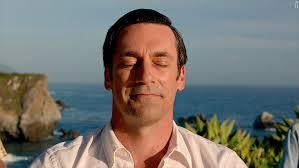The finale of Mad Men was not what I expected. The day before the finale aired I was hoping Don Draper would change his name to Dick Whitman and turn his back on the advertising world. I hoped he would buy a ranch in Wyoming and fall in love with the perfect woman (a woman he would never even consider being unfaithful to). Then Don would become the perfect father and teach his children how to ride horses and appreciate life. Most of all, I hoped that Don Draper would find inner peace and happiness. But wait a minute, maybe he did. And maybe he did it in typical Don Draper fashion.
In the final scene, while meditating on retreat, Don seems to have an epiphany. What I love most about his enigmatic smile is that it leaves so much up to the imagination. What is Don thinking? Is he experiencing true inner peace and happiness for the first time in his life? Or did he just have the idea for the iconic Coke ad, "I'd like to buy the world a Coke?" Does he rush back to Manhattan, and take the advertising world by storm? Or does he phone the idea to Peggy, letting her take the credit for it? Or is it possible for him to have it all? Somehow I think that is exactly what Don Draper would do.
In 1971, I was just a little girl. Every night while we ate dinner, we listened to the news. My father kept the television around a corner so that he was the only one who could see the screen. We could still hear the newscast and somehow this made it worse. Our nightly dinner was filled with the sounds of machine gun fire from the Vietnam War, reports of race riots, assassinations and the mass murders of Charles Mansion.
Then the Coke, hilltop ad came out. Every time it was on television, I ran to the screen and watched that ad intently. I wanted to forget about the machine gun fire and the mass murders. Instead I wanted the world to be just like that ad. I wanted to live in a multicultural place where diverse people were accepted and everyone got along. I wanted there to be peace and cooperation and happiness. I wanted the world to be a loving home where everyone belonged.
It might sound corny to some, but it didn't sound corny in 1971 when the civil rights movement still had much to accomplish and the Vietnam War was not yet over. It had been only three years since Dianne Carroll stared in the first TV series to feature a non-stereotypical, African American woman, a role for which she received death threats. In contrast, the Coke, hilltop ad had so much hope in it and it may have featured the first authentic, multicultural group every to be broadcast on national television.
But what about Don Draper? If he created that iconic ad, then no doubt he became even richer, but since when has Don Draper really cared about that?
So what does Don Draper really care about? In his confession to Peggy, he's ashamed that he "Took another man's name and made nothing of it." If Don Draper were to make something of his name, what would it be?
No doubt Don Draper is a cheat, a liar, a philanderer and a deserter, yet he's also generous, kind and caring. He sometimes forgets to help his wives and children. Yet somehow he always manages to help perfect strangers. He's painfully aware of his faults but what makes him easy to root for is that Don Draper wants desperately to be a better person.
He seemed to identify most with Leonard, the man whom nobody notices. Leonard says, "I've never been interesting. I work in an office. People walk right by me. I know they don't see me. And nobody chooses me." Then this man named Leonard sobs and Don hugs him and sobs too.
Handsome, successful Don Draper is the man whom nobody sees, just like Leonard. And at that moment he is the man whom nobody chooses. But Don wants to be better. And we want the same things that Don wants.
We want Don to be a better person.
We want the world to be a better place.
We want to be better people too.
Advertisers know this and they convince us to buy products by promising that the products will make us richer, prettier, more popular, smarter, thinner, and happier. Advertising works because it convinces us that we will become better people, if we buy their products. They promise the transformation that everyone longs for. The products they sell by and large don't provide any transformation, but just the mere promise of transformation will make us happy to spend our money.
So in the finale of Mad Men, I see the potential for Don Draper to finally become a better person, to finally make something meaningful of the name he stole.
Maybe Don continued to practice meditation. In 1971 some of the first meditation centers opened in Manhattan. Maybe Don didn't just create the iconic ad that gave people hope for a better world. Maybe he continued to help people like Leonard. Maybe he encouraged other businessmen to practice meditation or to find some other way to achieve transformation.
With the inevitable death of Betty Draper, I hope Don found a way to be a better father to his children. I can even imagine him as a faithful husband with a happy home. Whatever we imagine happening for Don Draper, we should remember that advertising is just the promise of a better life. Actual transformation is the real thing, and I like to think that Don Draper found the real thing after all.

